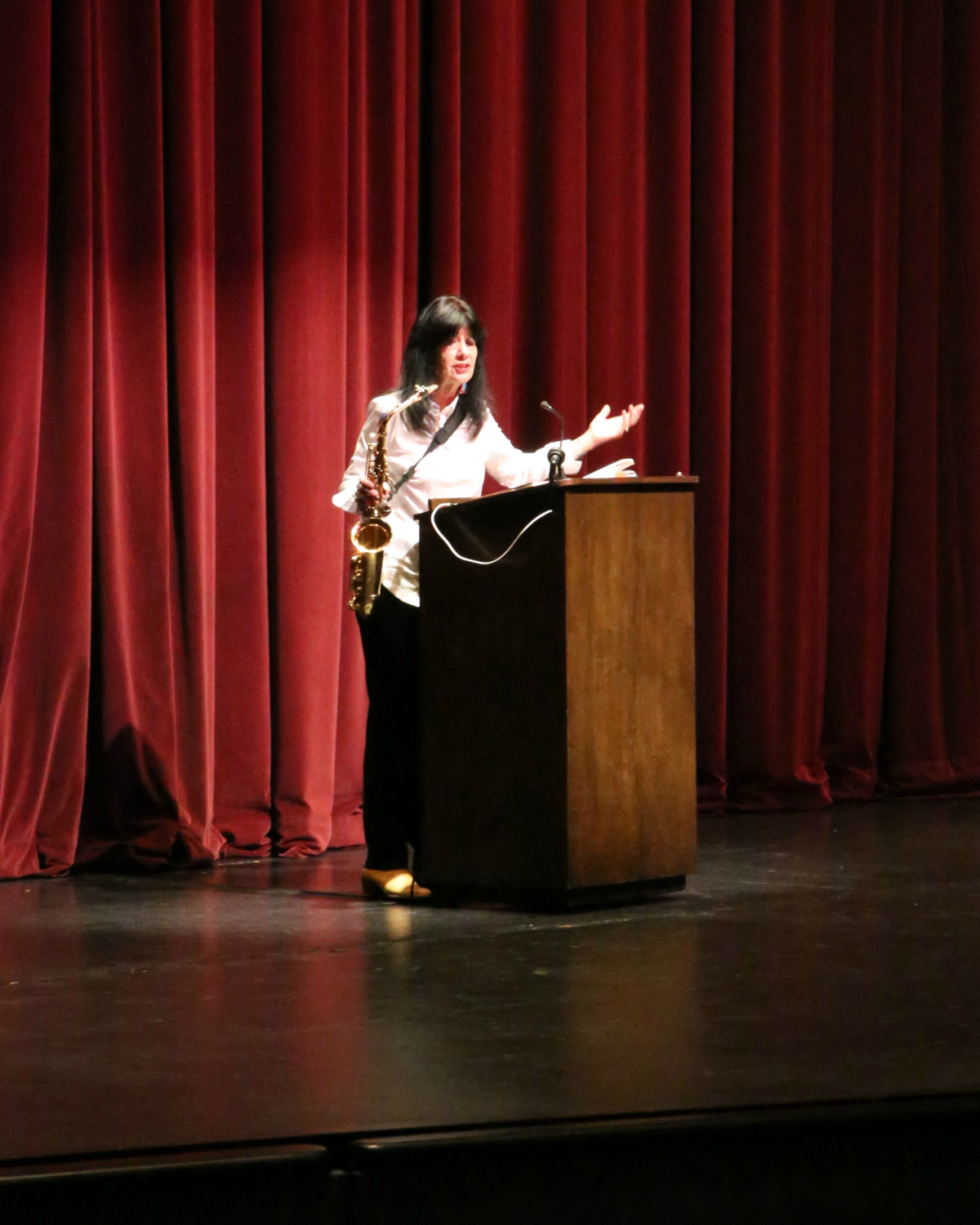Joy Harjo wasn’t always the nation’s official poet, or even a celebrated artist. Yet as a child she knew she was destined to pursue an artistic path.
“I knew that I had come here to be creative,” she said. “It was a long story, and even then, every day you wonder, ‘Will I ever write another poem? How is this going to work?’ But we’re all involved in the act of creation. Everybody here is actively creating their life. Everybody is.”

Harjo, an author and performer who recently became the first Native American selected as Poet Laureate of the United States, drew a packed house as the featured speaker at the 11th annual Creative Edge Lecture. The event was held Friday, Feb. 28 at the Irvine Barclay Theatre.
Hosted by Arts Orange County with support from OCDE and Fourth District PTA, the Creative Edge Lecture series was established in 2010 to feature thought-leaders and innovators whose work is served by creativity. Last week’s presentation was free to students, educators, business leaders, artists and community members. Harjo said they were all joined in a creative moment.
“There is no performance or lecture without an audience,” she said. “There is not one without this land we’re on, or this building. This building has a history. Every building has a spirit. Every day has a spirit. Every moment. Sunrise. We’re all in a beautiful ceremony together, of the sun.”
Telling an American story
Harjo, from Tulsa, Oklahoma, is a member of the Muscogee Creek Nation. She earned the Ruth Lilly Prize from the Poetry Foundation in 2017, and in 2015 she was presented with the Wallace Stevens Award from the Academy of American Poets.
Last summer, she was named the 23rd Poet Laureate of the United States by Librarian of Congress Carla Hayden, who praised her use of inventive lyricism to tell “an American story of tradition and loss, reckoning and myth-making.”
In addition to authoring nine books of poetry, Harjo has written plays, children’s books and a memoir titled, “Crazy Brave.” She’s also a celebrated musician, having learned the saxophone at age 40.
On Feb. 28, she brought her sax and a native flute to perform a handful of original songs, some powered by her evocative and inimitable poetry. One instrumental was improvised on the spot. She said the piece was inspired by the people, plants and lands around her.
“If you’re an American, you’re part of us, and this is to acknowledge the gifts of this place, that we’re here,” she said. “All of us are here, and we have an opportunity this day to go out and to create a world in which we all have a place, in which we are honored, and our children are safe.”
Creativity, kindness and connectedness
Following remarks by Arts Orange County President Richard Stein, County Superintendent Dr. Al Mijares took the stage to introduce Harjo. Mijares specifically called out the artist’s emphasis on kindness, adding that OCDE is pursuing similar aims through its One Billion Acts of Kindness initiative.
“We’re going to do it, and we have so many people engaged, and I hope that you’ll join us in this effort,” Mijares told the audience. “It’s done in the spirit of trying to deal with the toxicity that we see in our society, stuff that surfaces and then gets into even the classroom and affects our culture, so we have to be reminded of civility, kindness, respect for all — and all means all.”
Harjo began her presentation by telling the audience that “this is not your typical lecture,” and she was true to her word. Over the next 45 minutes, there would be music, a handful of poetry readings, reflections on her past, and colorful insights on creativity, kindness and connectedness.
According to her website, Harjo began writing poetry as a member of the University of New Mexico’s Native student organization, the Kiva Club, in response to the Native empowerment movement. Before that, she was accepted to the Institute of American Indian Arts on the strength of her drawings.
Today, the institute is a highly regarded arts college, but at the time it was still run by the Bureau of Indian Affairs. Along with drama and dance troupes, Harjo said there were stoves to teach young women to cook, and young men were taught dairy farming out back.
“But we were there, all of these great native people from all over the country, and I loved it,” she said. “It was the first time in my life that I was given permission to speak as a native person in a classroom and to feel free in creativity.”
Humans, she told the audience, need the arts, just as they need food, clothing and shelter.
“We need spiritual food,” she said. “We need food, nourishment for our minds, and our spirits.”
“Everybody in here, when you came into this world, when you took breath, that was your promise that said, ‘Okay, I’m a human being. I’m here,'” Harjo said. “And with that breath … it was like a contract that yes, you were coming in with gifts, and you came in with challenges. And you’re meant to share those gifts. That’s part of the process of living.”
